新四级翻译之--增译法
英语翻译汉语的方法――增词翻译法-2019年教育文档
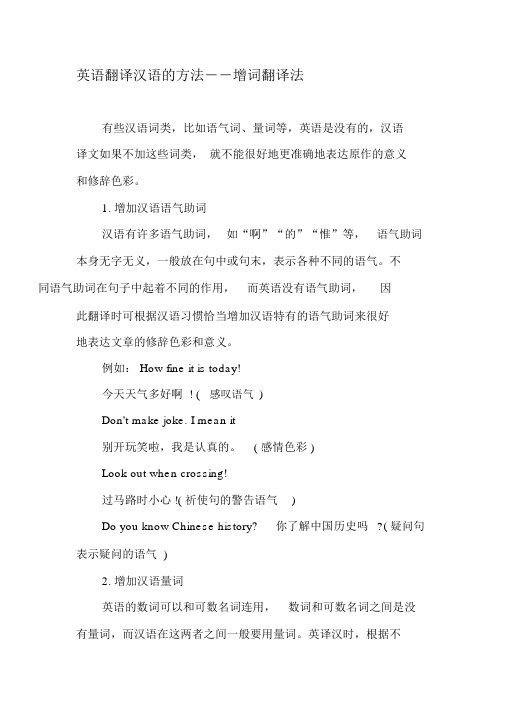
英语翻译汉语的方法――增词翻译法有些汉语词类,比如语气词、量词等,英语是没有的,汉语译文如果不加这些词类,就不能很好地更准确地表达原作的意义和修辞色彩。
1.增加汉语语气助词汉语有许多语气助词,如“啊”“的”“惟”等,语气助词本身无字无义,一般放在句中或句末,表示各种不同的语气。
不同语气助词在句子中起着不同的作用,而英语没有语气助词,因此翻译时可根据汉语习惯恰当增加汉语特有的语气助词来很好地表达文章的修辞色彩和意义。
例如: How fine it is today!今天天气多好啊 ! (感叹语气)Don't make joke. I mean it别开玩笑啦,我是认真的。
( 感情色彩 )Look out when crossing!过马路时小心 !( 祈使句的警告语气)Do you know Chinese history?你了解中国历史吗( 疑问句表示疑问的语气 )2.增加汉语量词英语的数词可以和可数名词连用,数词和可数名词之间是没有量词,而汉语在这两者之间一般要用量词。
英译汉时,根据不同的名词增加表示名词形状、特征,或数量的名量词,如“辆”“轮”“条”“头”等量词。
例如: a car.一辆汽车。
A red sun is rising slowly.一轮红日冉冉升起。
(一轮)He keep a dog.他养了一头狗。
(一头)3.增加汉语词尾词英语的大多数可数名词表示复数时在词尾加s(es ,ies) ,而汉语的名词复数是在名词后加译个尾词“们”,特别是表示性别、专业、职业的人称名词。
例如: Scientists have tried to come up with biologicalexplanations for the difference between boys and girls.科学家们一直试图从生物学的角度方面来解释男孩女孩的着种差异。
Ladies and gentlemen.女士们,先生们。
常用十大翻译技巧之一:增译法
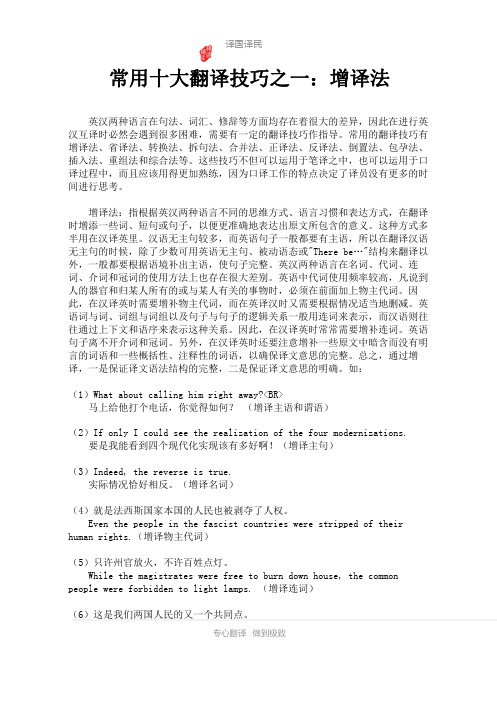
专心翻译 做到极致常用十大翻译技巧之一:增译法英汉两种语言在句法、词汇、修辞等方面均存在着很大的差异,因此在进行英汉互译时必然会遇到很多困难,需要有一定的翻译技巧作指导。
常用的翻译技巧有增译法、省译法、转换法、拆句法、合并法、正译法、反译法、倒置法、包孕法、插入法、重组法和综合法等。
这些技巧不但可以运用于笔译之中,也可以运用于口译过程中,而且应该用得更加熟练,因为口译工作的特点决定了译员没有更多的时间进行思考。
增译法:指根据英汉两种语言不同的思维方式、语言习惯和表达方式,在翻译时增添一些词、短句或句子,以便更准确地表达出原文所包含的意义。
这种方式多半用在汉译英里。
汉语无主句较多,而英语句子一般都要有主语,所以在翻译汉语无主句的时候,除了少数可用英语无主句、被动语态或"There be…"结构来翻译以外,一般都要根据语境补出主语,使句子完整。
英汉两种语言在名词、代词、连词、介词和冠词的使用方法上也存在很大差别。
英语中代词使用频率较高,凡说到人的器官和归某人所有的或与某人有关的事物时,必须在前面加上物主代词。
因此,在汉译英时需要增补物主代词,而在英译汉时又需要根据情况适当地删减。
英语词与词、词组与词组以及句子与句子的逻辑关系一般用连词来表示,而汉语则往往通过上下文和语序来表示这种关系。
因此,在汉译英时常常需要增补连词。
英语句子离不开介词和冠词。
另外,在汉译英时还要注意增补一些原文中暗含而没有明言的词语和一些概括性、注释性的词语,以确保译文意思的完整。
总之,通过增译,一是保证译文语法结构的完整,二是保证译文意思的明确。
如:(1)What about calling him right away?<BR>马上给他打个电话,你觉得如何? (增译主语和谓语)(2)If only I could see the realization of the four modernizations. 要是我能看到四个现代化实现该有多好啊!(增译主句)(3)Indeed, the reverse is true.实际情况恰好相反。
翻译之增译法
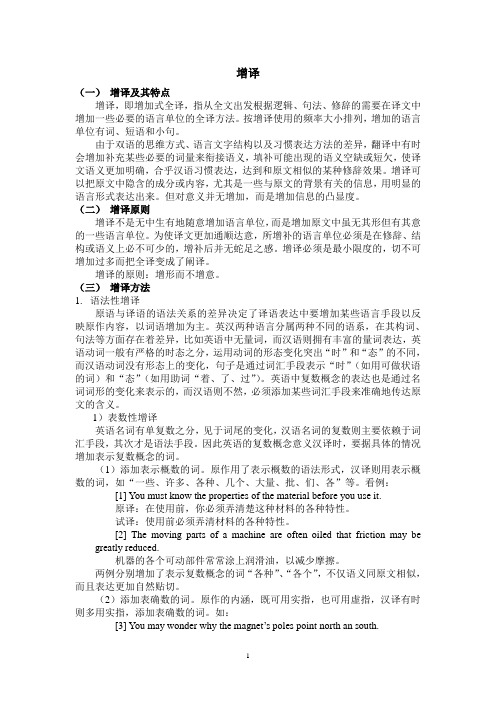
增译(一)增译及其特点增译,即增加式全译,指从全文出发根据逻辑、句法、修辞的需要在译文中增加一些必要的语言单位的全译方法。
按增译使用的频率大小排列,增加的语言单位有词、短语和小句。
由于双语的思维方式、语言文字结构以及习惯表达方法的差异,翻译中有时会增加补充某些必要的词量来衔接语义,填补可能出现的语义空缺或短欠,使译文语义更加明确,合乎汉语习惯表达,达到和原文相似的某种修辞效果。
增译可以把原文中隐含的成分或内容,尤其是一些与原文的背景有关的信息,用明显的语言形式表达出来。
但对意义并无增加,而是增加信息的凸显度。
(二)增译原则增译不是无中生有地随意增加语言单位,而是增加原文中虽无其形但有其意的一些语言单位。
为使译文更加通顺达意,所增补的语言单位必须是在修辞、结构或语义上必不可少的,增补后并无蛇足之感。
增译必须是最小限度的,切不可增加过多而把全译变成了阐译。
增译的原则:增形而不增意。
(三)增译方法1.语法性增译原语与译语的语法关系的差异决定了译语表达中要增加某些语言手段以反映原作内容,以词语增加为主。
英汉两种语言分属两种不同的语系,在其构词、句法等方面存在着差异,比如英语中无量词,而汉语则拥有丰富的量词表达,英语动词一般有严格的时态之分,运用动词的形态变化突出“时”和“态”的不同,而汉语动词没有形态上的变化,句子是通过词汇手段表示“时”(如用可做状语的词)和“态”(如用助词“着、了、过”)。
英语中复数概念的表达也是通过名词词形的变化来表示的,而汉语则不然,必须添加某些词汇手段来准确地传达原文的含义。
1)表数性增译英语名词有单复数之分,见于词尾的变化,汉语名词的复数则主要依赖于词汇手段,其次才是语法手段。
因此英语的复数概念意义汉译时,要据具体的情况增加表示复数概念的词。
(1)添加表示概数的词。
原作用了表示概数的语法形式,汉译则用表示概数的词,如“一些、许多、各种、几个、大量、批、们、各”等。
看例:[1] You must know the properties of the material before you use it.原译:在使用前,你必须弄清楚这种材料的各种特性。
翻译技巧-增减译法

02
CATALOGUE
减译法介绍
什么是减译法
• 减译法,也称为省略法,是指在 翻译过程中,为了使译文更加流 畅、自然,对原文中的某些词、 短语或句子进行适当的省略或简 化。这种方法在翻译中非常常见 ,尤其是在处理长句、复杂句或 重复表达时。
减译法的作用
提高译文流畅性
通过省略不必要的词或短语,使 译文更加简洁明了,易于读者理 解。
03
在科技翻译中,适当减少一些 不必要的细节或重复的表述, 可以使译文更加简洁明了,提 高可读性。
04
CATALOGUE
增减译法的注意事项
注意语境和文化差异
在翻译过程中,要注意原文的语境和文化背景,对于某些特定表达或习语,如果直译可能导致读者无 法理解,可以适当增加解释或注释,帮助读者更好地理解。
在翻译过程中,如果原文语义不完整或不明确,可以通过增译法 补充相关语义,使译文更加准确。
文化背景解释
当原文涉及到特定文化背景或特殊表达方式时,可以通过增译法解 释相关背景或表达方式,帮助读者更好地理解译文。
修辞效果增强
在翻译过程中,可以通过适当增加一些词语或短语,增强译文的修 辞效果,使译文更加生动、形象。
01 阅读翻译理论相关书籍和文献,了解增减译法的 原理和技巧。
02 参加翻译培训课程或工作坊,系统学习增减译法 的应用和注意事项。
03 关注翻译领域的最新动态和研究成果,不断更新 理论知识。
不断反思和总结翻译经验
01
在完成翻译后,对增减译法的运用进行反思和评估,
总结成功和不足之处。
02
分析翻译过程中遇到的困难和问题,找出原因并寻求
VS
在翻译过程中,要仔细阅读原文,理 解其含义和语境,对于原文中的重要 信息,要准确地进行翻译,不能遗漏 或随意更改。
增译法定义
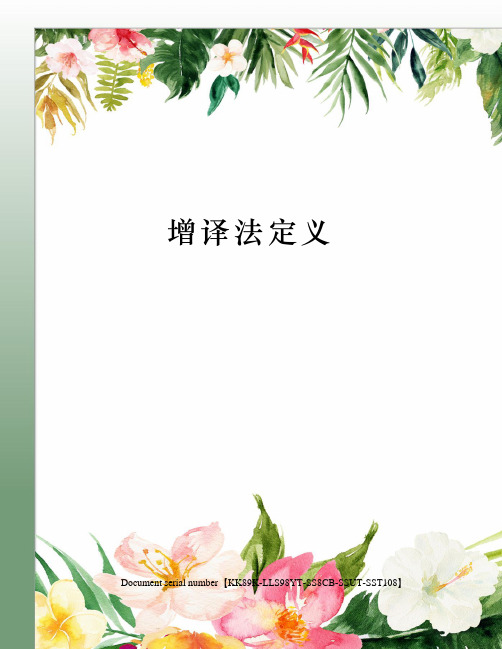
增译法定义Document serial number【KK89K-LLS98YT-SS8CB-SSUT-SST108】增译法定义英汉两种语言在句法、词汇、修辞等方面均存在着很大的差异,因此在进行英汉互译时必然会遇到很多困难,需要有一定的翻译技巧作指导。
常用的翻译技巧有增译法、省译法、转换法、拆句法、合并法、正译法、反译法、倒置法、包孕法、插入法、重组法和综合法等。
这些技巧不但可以运用于笔译之中,也可以运用于口译过程中,而且应该用得更加熟练,因为口译工作的特点决定了译员没有更多的时间进行思考。
1、增译法:指根据英汉两种语言不同的思维方式、语言习惯和表达方式,在翻译时增添一些词、短句或句子,以便更准确地表达出原文所包含的意义。
这种方式多半用在汉译英里。
汉语无主句较多,而英语句子一般都要有主语,所以在翻译汉语无主句的时候,除了少数可用英语无主句、被动语态或"There be…"结构来翻译以外,一般都要根据语境补出主语,使句子完整。
英汉两种语言在名词、代词、连词、介词和冠词的使用方法上也存在很大差别。
英语中代词使用频率较高,凡说到人的器官和归某人所有的或与某人有关的事物时,必须在前面加上物主代词。
因此,在汉译英时需要增补物主代词,而在英译汉时又需要根据情况适当地删减。
英语词与词、词组与词组以及句子与句子的逻辑关系一般用连词来表示,而汉语则往往通过上下文和语序来表示这种关系。
因此,在汉译英时常常需要增补连词。
英语句子离不开介词和冠词。
另外,在汉译英时还要注意增补一些原文中暗含而没有明言的词语和一些概括性、注释性的词语,以确保译文意思的完整。
总之,通过增译,一是保证译文语法结构的完整,二是保证译文意思的明确。
如:(1)What about calling him right away?马上给他打个电话,你觉得如何?(增译主语和谓语)(2)If only I could see the realization of the four modernizations. 要是我能看到四个现代化实现该有多好啊!(增译主句)(3) Indeed, the reverse is true实际情况恰好相反。
新四级翻译之--增译法

增词法(主语)
• 此外,英语名词复数,汉译时还可以根据 情况,增加重叠词、数词或其它一些词来 表达。这样做还可以提高修辞效果。 • 表达人的名词时,可在后面加“们”字 • The students are listening carefully. • 学生们在认真听课。 • The children are playing in the garden. • 孩子们在花园玩耍。
TRANSLATION CET4 (增译法)
翻译技巧
1 主语的选择 6 减译法 2 无主句的翻 译 7 增译法 3 调整语序 8 合并译法 4 词性转换 9 “让”字句 的译法 5 动词时态的 翻译 10 “使”字句 的译法
9/9/2014
减译法
增译法? 要增加什 么呢?
1. 增译 法 2. 增译 方法 3. 增译 练习
9/9/2014
增词法(抽象名词)
• From the evaporation of water people know that liquids can turn into gases under certain conditions. • 人们从水的蒸发现象了解到,液体在一定 条件下能变成气体。
9/9/2014
增词法(抽象名词)
• We have made some achievements, and we must guard against complacency. • 我们取得一些成就,但要防止自满情绪。 • The remedy you propose is neat and easy but impossible. • 你提的补救措施倒是干脆利落、轻而易举, 但是行不通。
9/9/2014
增词法(主语)
增译法在汉英翻译中的运用
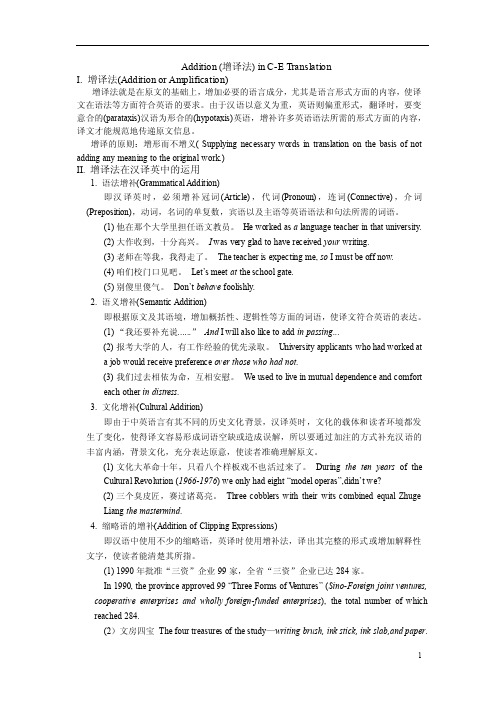
Addition (增译法) in C-E TranslationI. 增译法(Addition or Amplification)增译法就是在原文的基础上,增加必要的语言成分,尤其是语言形式方面的内容,使译文在语法等方面符合英语的要求。
由于汉语以意义为重,英语则偏重形式,翻译时,要变意合的(parataxis)汉语为形合的(hypotaxis)英语,增补许多英语语法所需的形式方面的内容,译文才能规范地传递原文信息。
增译的原则:增形而不增义( Supplying necessary words in translation on the basis of not adding any meaning to the original work.)II. 增译法在汉译英中的运用1. 语法增补(Grammatical Addition)即汉译英时,必须增补冠词(Article),代词(Pronoun),连词(Connective),介词(Preposition),动词,名词的单复数,宾语以及主语等英语语法和句法所需的词语。
(1)他在那个大学里担任语文教员。
He worked as a language teacher in that university.(2)大作收到,十分高兴。
I was very glad to have received your writing.(3)老师在等我,我得走了。
The teacher is expecting me, so I must be off now.(4)咱们校门口见吧。
Let’s meet at the school gate.(5)别傻里傻气。
Don’t behave foolishly.2. 语义增补(Semantic Addition)即根据原文及其语境,增加概括性、逻辑性等方面的词语,使译文符合英语的表达。
(1)“我还要补充说......”And I will also like to add in passing...(2)报考大学的人,有工作经验的优先录取。
大学英语四级考试_之_段落翻译
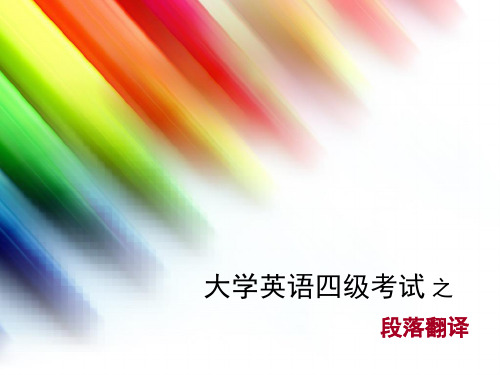
It is utterly wrong to imagine that Chinese people are liable to use force and resolve problems through violence.
LOGO
• “Would you like tea or coffee?” This is a question which the dining people are frequently asked. Some westerners tend to choose coffee, while the Chinese usually choose tea. There is a legend that one Chinese emperor found tea 5,000 years ago and used it to cure illnesses. During the Ming and Q ing Dynasties, tea houses were widespread throughout China. Tea-drinking was spread to Japan in the 6th century but to Europe and America until the 18th century. Nowadays, tea is one of the most popular beverages in the world. Tea is the treasure of China, and it is also an important part of the Chinese tradition and culture.
- 1、下载文档前请自行甄别文档内容的完整性,平台不提供额外的编辑、内容补充、找答案等附加服务。
- 2、"仅部分预览"的文档,不可在线预览部分如存在完整性等问题,可反馈申请退款(可完整预览的文档不适用该条件!)。
- 3、如文档侵犯您的权益,请联系客服反馈,我们会尽快为您处理(人工客服工作时间:9:00-18:30)。
9/9/2014
4. 我不爱喝饮料。 • I don’t like soft drinks. 5. 人和动物不同。 • Man is different from other animals.
9/9/2014
增词法(Amplification) • 增词法就是在翻译时根据意义上或修辞上 或句法上的需要增加原文中虽无其词但有 其义的一些词。 • 目的是使译文忠实表达原文的信息与风格 并使译文合乎表达习惯。 • 要注意的是,增词绝不是无中生有,不是 随意增加原文没有的意义。
9/9/2014
• •
•
•
• Tips The repetition… is more or less abnormal… (重复或多或少有些不规范) (The King’s English) 简洁明快的文风,英美人称之为 “clean English”。 其实,“简洁”也是一种用以加强语气的
修辞手段。
9/9/2014
1. 增词法(主语)
• 一、抽象名词的加字译出: • 英语中用表示一种状态、现象、心情、作 风、制度等意思的抽象名词作主语,有时 要加上适当的字,使之具体化译出。这类 抽象名词多是动词或形容词派生出来的名 词。
9/9/2014
• • • • • • • •
如: to persuade 说服 to prepare 准备 backward 落后 tense 紧张 brave 勇敢 mad 疯狂 hostile 敌对
9/9/2014
增词法(主语)
• 此外,英语名词复数,汉译时还可以根据 情况,增加重叠词、数词或其它一些词来 表达。这样做还可以提高修辞效果。 • 表达人的名词时,可在后面加“们”字 • The students are listening carefully. • 学生们在认真听课。 • The children are playing in the garden. • 孩子们在花园玩耍。
• As a result of those economies, many of our important new projects in other fields became possible. • 由于 (采取了) 这些节约措施,我们在其他 方面的许多重要的新工程才得以实施。
9/9/2014
9/9/2014
增词法(主语)
• 三、名词复数加字译出: • 汉语名词的复数没有词形变化,很多情 况下不必表达出来。但要表达指多数人 的名词时,可在该名词的后面加“们” 字,如“the teachers”“教师们”,或在 该名词前家上“诸位”、“各位”,如 “ladies and gentlemen” “诸位(各位) 女士和先生”。
9/9/2014
增词法(抽象名词)
• From the evaporation of water people know that liquids can turn into gases under certain conditions. • 人们从水的蒸发现象了解到,液体在一定 条件下能变成气体。
persuasion 说服工作 preparation 准备工作 backwardness 落后状态 tension 紧张状况 bravery 勇敢行为 madness 疯狂行为 hostility 敌对态度/情绪
9/9/2014
1.增词法(主语)
• Perfect preparation is the first step to the success of the party. • 完美的准备工作是… • The intimacy between them can be found at the first sight. • 他们之间的亲密关系一眼就能看出。 • In the summer of 1969, the Administration publicly urged an easing of tensions with China. • 1969年夏天,政府公开缓和与中国的紧张 关系。
试译以下句子: 1. He bought her a Benz as a birthday gift. 2. We won’t retreat; we never have and never will. 3. This laser copier is indeed cheap and fine. 4. 我不爱喝饮料。 5. 人和动物不同。
9/9/2014
• Байду номын сангаас意
• 汉语里有一些名词,如“任务”、“工 作”、“情况”、“状态”、“问题”、 “制度”、“事业”、“局面”等等通 常有具体的含义,自然应照译,但是它 们用来表明范畴时,则失去了具体含义, 一般可以省略不翻译。
9/9/2014
• 如“分析问题”中的“问题”一词,就有 具体含义,非翻译不可:parsing problems; 而“人民内部矛盾问题”中的“问题”则 是表明范畴,不必翻译,只要译作 “contradictions among the people”就行了。 在这里“矛盾”就是一种“问题”,而 “问题”一词仅仅表明这种“矛盾”所属 的范畴。
9/9/2014
二、代词加字译出: • 英语中用指示代词或不定代词做主语,如 果不加上原意确指的名词译出,会使主语 意思模糊,不明所指。 • The platforms are time-consuming; these alone took sixteen months to build. • …,仅仅这些平台就花了…
9/9/2014
增词法(主语)
• The windows of John’s room front on the garden. • 约翰房间的几个窗子都朝向花园。 • The banks of the river are covered with grass. • 河的两岸都被… • The advantages of the hall are bright, spacious, fashionable and without echo. • 这大厅有四大优点: 明亮、宽敞、样式
9/9/2014
增词法(主语)
• 有时主语形式上是单数,实际含义是复数, 也可以采取这种加字译法。例: • In elementary school, the child learns to read and write. • 在小学里,孩子们学习读书、写字。 • 除了加“们”,还可加重叠词来表达复数。 例: • Flowers bloom all over the yard. • 朵朵鲜花开满了庭院。
9/9/2014
1. He bought her a Benz as a birthday gift. • 他给她买了一辆奔驰汽车作为生日礼物。 2. We won’t retreat; we never have(…) and never will(…). • 我们不会后退,我们从来没有后退过,将 来也决不后退。 3. This laser copier is indeed cheap and fine. • 这台激光复印机真是价廉物美。
9/9/2014
增词法(主语)
• It is sheer irresponsibility to pick up the pen and “force ourselves to write” without investigation or study. • 不调查、不研究、提起笔来硬写,这完全 是不负责任的态度。 • For many years there has been serious unemployment in that country. • 多年来那个国家一直存在严重的失业现象。
9/9/2014
• 增译的部分在原文中虽找不出对应词语, 但为了忠实传达原文信息,译文非增不可。 • 增词的情况是各种各样的。总的规则是: 为使译文忠于原文,需要增加什么就增加 什么,而且要适可而止。 • Some metals are easy to machine; others are not. • 一些金属容易加工,而另一些金属却不容 易。
9/9/2014
增词法(抽象名词)
• We have made some achievements, and we must guard against complacency. • 我们取得一些成就,但要防止自满情绪。 • The remedy you propose is neat and easy but impossible. • 你提的补救措施倒是干脆利落、轻而易举, 但是行不通。
9/9/2014
增词法(主语)
• 汉英两种语言有一个重大差别,那就是 英语尽量避免重复,如果一句话里或相 连几句话里需要重复某个词语,则用代 词来代替,或以其他手段来避免重复。 所以英译汉时则要少用代词,多用实词。 汉语不怕重复,连续使用某个词语很常 见。汉语也使用代词,但不如英语用得 多。
9/9/2014
9/9/2014
例如: • 它显示出社会主义制度的优越性。 • It shows the superiority of socialism. • 前怕狼后怕虎的态度不能造就英雄。 • “ Fearing wolves ahead and tigers behind” will not produce hero.
例如: 他们的方法是一个很好的方法。 Their method is a very good method. Theirs is a very good method. Their method is a very good one. 另一种方法是生物化学方法。 Another method is the biochemical method. • Another method is the biochemical process. • Another approach is the biochemical method. • • • • • • •
